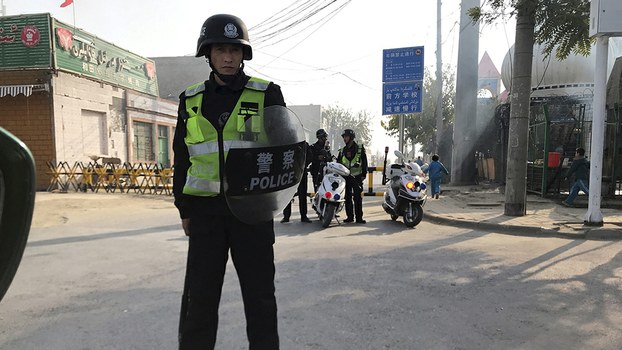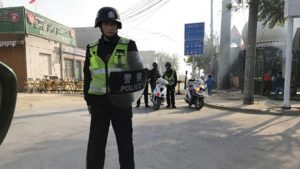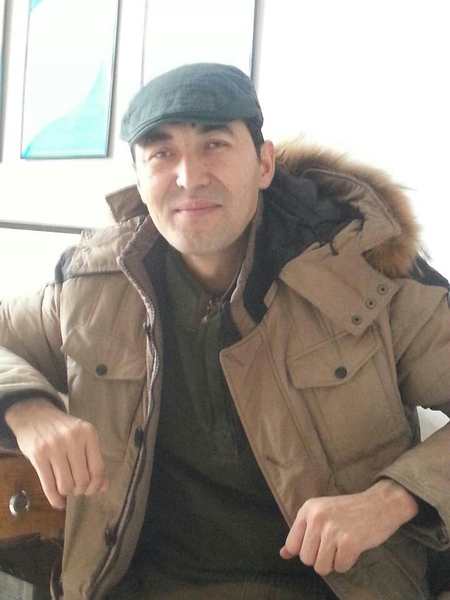China ‘Disappears’ Its Uighurs, Silences the World With Money

Real Clear Investigations, 09 August 2018
 By Richard Bernstein – One day in 2016, Mamatjan Juma, a Washington-based reporter for Radio Free Asia, got an early indication that family members back in his home town of Kashgar, in far western China, were in grave danger.
By Richard Bernstein – One day in 2016, Mamatjan Juma, a Washington-based reporter for Radio Free Asia, got an early indication that family members back in his home town of Kashgar, in far western China, were in grave danger.
“My parents told me to call only them on the phone, not to contact any of my brothers and sisters,” Juma said in a recent interview. “Anybody who talked to any foreign contact could be taken away,” he said, “so my parents were trying to protect my brothers and sisters.”
The precaution didn’t work. Months later, two of Juma’s brothers were indeed taken away — one, he was informed, to the notorious Detention Center Number One in Urumqi, the capital of China’s Xinjiang-Uighur Autonomous Region. He believes the other was most likely sent to what’s euphemistically called a “transformation through education center,” ostensibly to turn him away from the Islamic extremism that, in the Chinese account of things, has been responsible for several terrorist assaults in China in recent years.
Mamatjan Juma of Radio Free Asia, whose family members are missing. Top photo: a show of force in Kashgar, his home town.
Since then, one by one, Juma has lost contact with the rest of his living family, his mother and his three sisters (his father recently died). He doesn’t know where they are, only, as he put it, that “they have gone silent.”
Over the past year, a substantial body of evidence has emerged of massive human rights violations by the Chinese government against Muslim minority groups, mostly Uighurs (pronounced WEE-gurs) but also ethnic Kazakhs and others who live in the vast Xinjiang region.

Ehmetjan, high school teacher, brother of Mamatjan Juma — and missing.
According to visitors to Xinjiang, human rights researchers, and the U.S. Department of State, China has gone well beyond its longstanding crackdown on Uighur religious observances in the name of reducing tension – measures like banning the muezzin from calling people to Friday prayer, or forbidding Muslim civil servants from fasting on Ramadan. It has now moved into a new and harsher phase of repression, notably including mass political indoctrination aimed at eradicating ideas and practices that, in the official Chinese view, are behind Muslim extremism and violence.

Abdukadir, writer, brother of Mamatjan Juma — and missing.
Scholars of Xinjiang who have examined dozens of Chinese documents and press reports estimate that at least hundreds of thousands and very likely over a million Uighurs—a bit over 10 percent of their entire population—have been put into the “transformation through re-education” (or “de-radicalization”) centers, which critics of China are calling concentration camps.
In April, Sen. Marco Rubio and Rep. Chris Smith, co-chairmen of the U.S. Congressional-Executive Commission on China, called Xinjiang “the largest mass incarceration of a minority population in the world today.” That same month, the State Department hosted six Uighur journalists to get the word out. In late July, the department hosted a seminar on religious persecution around the world — and in a USA Today op-ed, Secretary of State Mike Pompeo specifically emphasized the plight of the Uighurs.
Yet with these and a few other notable exceptions, the world has remained largely silent about this crisis. This is not merely an oversight: The silence reflects China’s success in using its diplomatic and financial muscle to deflect criticism of its human rights violations — and erode the existing set of conventions and declarations on human rights put into place by Western democracies in the years after World War II.
One place where China wields this clout is the United Nations, specifically from its perch on the U.N. Human Rights Council. “China is able to effectively block any action on its appalling human rights record in Xinjiang, as well as scrutiny of the broader human rights crackdown under way in China,” Kelley Currie, the American ambassador to the U.N. Economic and Social Council, testified at a recent congressional hearing.
Chinese pressure, she and other witnesses said, has made most countries reluctant to take up the Uighur cause, or, indeed, the larger Chinese human rights cause. So, it seems, are most world leaders, senior U.N. officials, religious figures, and the very organizations, like the Human Rights Council, whose purpose is to promote and protect human rights around the world.
“The world isn’t paying much attention,” Juma said.
Among the reasons is the implicit understanding made when some countries receive economic benefits, especially investments or loans from China. They are expected not just to refrain from criticizing Chinese human rights violations, but to try and stop other nations from doing so as well. In one conspicuous example last year, financially troubled Greece, after receiving hundreds of millions of dollars of Chinese infrastructure investment, blocked the European Union from issuing a declaration criticizing China for its crackdown on dissidents and the lawyers who defend them. It was the first time that the EU had been unable to issue such a declaration.
But there are other reasons the mass imprisonment of Uighurs in Xinjiang has not provoked the loud international outcry that, for example, arose in response to Myanmar’s persecution of its Muslim minority. Unlike the Rohingya, whose suffering was captured in photographs and videos and described to journalists by refugees, the Uighurs’ plight has essentially been invisible to the outside world. For years, China has limited media access to Xinjiang. The few journalists who have ventured there report being subjected to heavy-handed surveillance, while local people are prevented from talking to them.
“Even the Muslim world doesn’t protest,” Juma said, singling out predominantly Muslim countries like Pakistan, which has taken billions of dollars in loans from China. And Pakistan has gone further than remaining silent. It has been complicit in the Uighur repression. Pakistanis have forcefully repatriated Uighurs who had escaped from China and were seeking asylum or trying to go on to safe haven in Turkey. This is not isolated to Pakistan, either. It’s happened to Uighurs who made it to Malaysia, Thailand, Uzbekistan, and Cambodia as well. In all, these countries have forced several hundred Uighurs back to China, where it has been difficult for outsiders to track their whereabouts, although Radio Free Asia, using its network of Uighur informants, has reported on some of them imprisoned or executed. .
The Uighurs are a Sunni Muslim group who speak a language closely related to Turkish and have lived in the oasis cities and rural areas of Xinjiang for centuries. There, as the phrase “Xinjiang-Uighur Autonomous Region” suggests, they are technically entitled to have a degree of cultural freedom and self-government. Still, relations between the Uighurs and their ethnic Chinese overlords have always been tense. They have worsened in the past quarter-century as China has encouraged the migration of Han Chinese into traditional Uighur territory, reducing Uighurs to a minority.
Although China argues that it has made economic investments in the region’s infrastructure – justifying the migration — Uighurs contend that Chinese spending has largely benefited the Han settlers. A frequent complaint is that Han Chinese are favored with the well-paying new jobs, and best roads, lined with the tall apartment buildings where the migrants live — built (by Han construction workers) in old, traditionally Uighur areas.
Over the years, the ancient center of Kashgar, once a fabled, exotic oasis on the Silk Road, has been demolished, leading to the forced relocation of hundreds of thousands of Uighurs to suburban locations, even as the old center of town has been turned into a touristic theme park. China argues that the houses were old and unhealthy, but Uighurs see the redevelopment of traditional neighborhoods as part of a long-term effort to destroy Uighur cultural identity—an architectural counterpart to the influx of millions of Han Chinese.
Among the leading public critics of China’s policy in Xinjiang was Ilham Tohti, a globally recognized economist whose research documented how Xinjiang’s development was more beneficial to ethnic Han than to the Uighurs. Tohti was arrested in 2014 and put on trial in a closed courtroom for his alleged advocacy of “separatism.” Among the charges against him was promoting ideas that “aggravated ethnic relations” and complaining that Uighurs were “under constant repression.” Tohti was found guilty of “drawing the attention of the international community” to this issue, which in China is apparently a crime. He was sentenced to life in prison.
Given the lack of any peaceful avenues of protest or complaint, violent ethnic protests have flared in Xinjiang. The worst incident occurred nearly 10 years ago when a largely Uighur mob went on the rampage in Urumqi, and, according to official Chinese accounts, 197 people, most of them ethnic Han Chinese, were killed. Other deadly clashes include a 2014 train station attack in Kunming where 31 ethnic Chinese bystanders were knifed to death by eight Uighur men and women.
Instead of acknowledging the possibility that some Uighur grievances might be justified, China has essentially labeled opponents of its policies in Xinjiang as either terrorists or separatists who, like Tohti, deserve harsh punishment.
Although China-based journalists are closely watched when they visit Xinjiang, they have managed to report on an array of security measures ostensibly aimed at preventing further Uighur attacks, often using advanced technology. Among them, sellers of kitchen knives are reportedly required to photograph purchasers, record their IDs and imprint a QR code on the knife, so it can be traced to its owner if used in a crime. The Wall Street Journal reported recently that Uighurs going on the annual Muslim pilgrimage to Mecca have had to wear tracking devices. The Chinese say this is for their protection, but human rights groups see the measure as a means of high-tech surveillance.
Other measures have clearly been aimed at reducing the Uighurs’ religious and cultural attachments or, as the Chinese have officially put it, adapting “religion to a socialist society.” In addition to forcing young men to shave off beards deemed too long and silencing the muezzin, China has banned parents from giving their children names associated with Islam, encouraged Uighurs with government jobs to eat pork and to drink alcohol, and required Uighur grocers to stock liquor on their shelves.
According to Western researchers, such heavy-handed tactics aimed at suppressing religious belief and practice reached draconian new levels two years ago, when a new party secretary, Chen Quanguo, was transferred to Xinjiang. Chen was reportedly sent to Xinjiang precisely because he had been effective in repressing dissent in his previous post, as party secretary in Tibet, where he developed some of the measures he set about putting into place in Xinjiang. One such method is referred to as “grid-style social management,” in which areas are divided into blocks, each with its own police station and surveillance cameras using facial recognition technology.
According to the congressional testimony of Jessica Batke, a former State Department intelligence analyst, Uighurs studying abroad have been recalled home, where some have been imprisoned. But the most sweeping new measure, mass incarceration in the “transformation through reeducation training centers,” revives a practice that had largely been abandoned in China in recent decades. It harks back to the Cultural Revolution when Mao’s regime employed vast “reform through labor” camps where millions of supposed “class enemies” and “rightists” were sent in the late 1950s and 1960s.
Chinese officials have denied the existence of these training centers and, as the experience of Mamatjan Juma indicates, precise information about them, and about the fate of family members, is nearly impossible to obtain. China’s public security apparatus operates in secrecy. Among its most common practices is not to inform family members of the whereabouts of anyone who has been arrested. Xinjiang is especially impenetrable in this respect. In 2011, when Cambodia forcibly repatriated 22 Uighurs to China, there were isolated reports that some of the returnees were imprisoned and executed, but there was simply no information made available about what happened to most of them. Two years ago, Thailand yielded to China’s demand to send back about 100 refugee Uighur men, vowing that the men would be treated according to “international legal standards.” In fact, almost nothing is known about their fate or what “standards” were used in their treatment.
The opaqueness of China’s public security system and the absence of information on detainees makes the situation all the more disturbing for people like Juma, who know that their family members have disappeared but do not know where they are. That also makes it difficult for human rights groups to quantify the extent of violations. Even the number of death sentences carried out in China—believed to be by far the highest in the world—is a state secret.
The veil of secrecy in Xinjiang was partly penetrated by a former employee of one of the camps who fled to neighboring Kazakhstan and testifed in open court against a Chinese extradition request. The woman, Sayragul Sautbay, said that thousands of Kazakhs have been incarcerated for what she called “political indoctrination.”
“Officially this is a training center where people study Chinese ideology,” she said of the camp where she worked, “but in reality, it’s a prison in the mountains.” She said there were 2,500 Kazakhs in her camp, and that she was told that there were at least two other such camps where Kazakhs were incarcerated.
A more comprehensive sense of the extent of Muslim incarceration has been provided by a German academic expert on Xinjiang, Adrian Zenz, who examined hundreds of press reports and official documents related to the construction of the “transformation through reeducation” infrastructure. Zenz found that during Chen’s first year as Xinjiang party secretary, advertisements were posted for some 91,000 new security positions, which would be more than 250 security agents for each 100,000 of the general population.
Similar public records are the main basis for Zenz’s estimates of the numbers of Uighurs and other members of ethnic minority groups sent to the camp system. Zenz found evidence that Uighurs were being assigned to reeducation centers on the basis of quotas being set by the government. One Chinese media report cited an official in the Xinjiang Justice Department saying, in effect, that in a typical Muslim village 30 percent of the population was “polluted by religious extremism” and “requires extensive education…work.”
Zenz also uncovered procurement and construction bids for the building of some 73 camps throughout Xinjiang’s territory. These appear to be of various sizes, but some are extremely large, exceeding 100,000 square feet and including hospitals and supermarkets. The 2017 budget of Akto County alone showed nearly $60 million for security related projects including “transformation through education centers infrastructure and equipment purchases.”
In all, using leaked documents and official reports, Zenz found in general that between 10 percent and 12 percent of the Muslim population of any given city or county in Xinjiang had been detained. “Xinjiang’s total reeducation internment figure might be just over one million,” he concluded, including Uighurs and members of other largely Muslim minority groups.
The experience of Juma and the other Radio Free Asia reporters whose families in Xinjiang have disappeared demonstrates another aspect of the Chinese repression, which is that it extends beyond China’s borders and appears to be aimed at controlling what is said about the Uighurs and other minorities elsewhere in the world. Juma’s family members, all well-educated, might well have been targets of “de-radicalization” anyway, but certainly it didn’t help that they had a brother living in the United States and broadcasting about conditions back home.
It is always an agonizing choice for someone whose relatives have disappeared in China: whether to remain silent in the hopes that the relative will be released, or to generate publicity about the missing person, in the hope that international attention might pressure the Chinese at least to offer lenient treatment to the detainee. In fact, as the fate of Ilham Tohti indicates, international pressure has had little effect on China’s public security bureau.
Still, with State Department encouragement, Juma and the other Washington-based reporters in the Radio Free Asia Uighur service—all of them either citizens or legal permanent residents—decided to go public about the disappearance of their relatives in Xinjiang. That was in April, and Mike Pompeo touted their message in his July 24 op-ed in USA Today. What Pompeo didn’t report was that within a week or so, Juma’s mother stopped answering her phone, his third brother disappeared, and one by one, he lost contact with all three of his sisters.
“This is the situation that we’re in,” he said, “and it’s the situation that most Uighurs are living in at the moment.”

